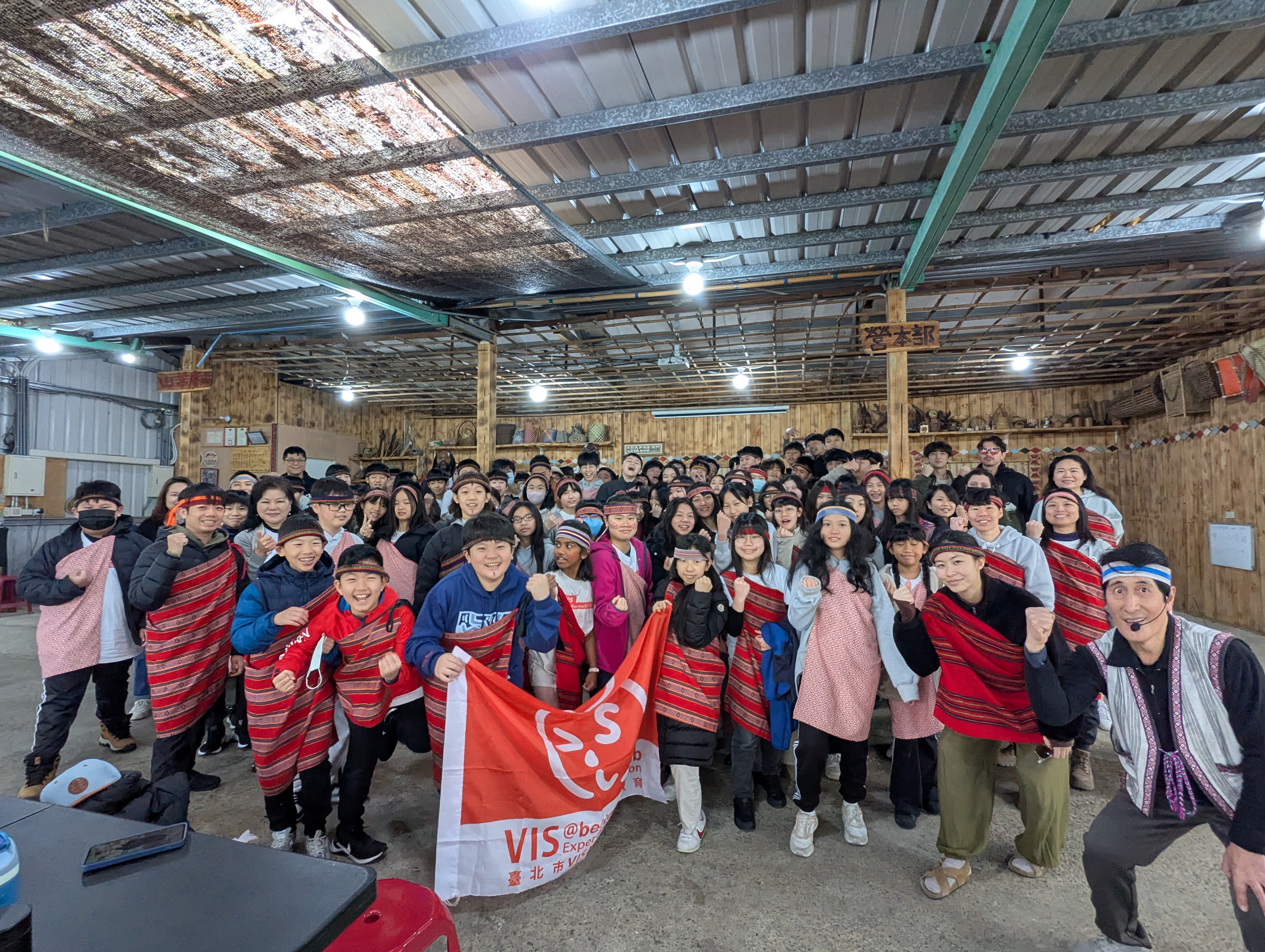
與山為鄰,與文化同行:VIS 國際實驗教育國中部部落文化體驗之旅(上篇)
上週三(4月2日),VIS 國際實驗教育國中部的師生們一早從臺北出發,踏上一段文化與自然交織的旅程,前往位於新北烏來的「給樹營地」,走進泰雅族的傳統生活世界。「給樹」是泰雅族語「九芎」的意思,也正是營地主人,即原住民文化推廣者陳金發老師的泰雅族名 Gesu。他熱情迎接我們的到來,並介紹了部落的 Torsw 校長及 Nowa、Behuy 等導師們。學生們在導師們的帶領下,穿上泰雅傳統服飾、學習泰雅族的打招呼方式、日常族語用語與傳統規範(gaga),一步步揭開這塊土地的深厚文化底蘊。
Gesu 老師說:「今天大家都是泰雅族的孩子(laqi)!」在這樣的氣氛下,VIS 學生們也真正以開放心態投入文化學習,身體力行地尊重、理解原住民的世界觀與生活方式。
接著,我們展開了一段香氣四溢的味蕾之旅——竹筒飯(mami btakan)製作與烤山豬體驗。學生們親自砍竹、裝飯、炙烤,從頭到尾手作傳統料理,不僅動手也動腦。無論是選材、切工還是火候掌握,都講究與自然環境的協調與感應。這是一堂原住民智慧的實踐課。
當香氣四溢的山豬肉與竹筒飯新鮮出爐後,大家在營地準備的豐盛原住民菜餚陪襯下,一同高喊:「Maniq mami!」(我們開動囉!)
這是一場不僅滋養味蕾,更滋養心靈的文化體驗。我們真正感受到:部落文化不只是歷史記憶,更是一種與自然共生的生活哲學。
下篇預告:泰雅族狩獵文化、麻糬製作,敬請期待!
Living with the Mountains, Learning from Culture: VIS Middle School’s Indigenous Cultural Exploration (Part 1)
Last Wednesday (April 2), VIS International JH students and teachers embarked on a journey that blended culture and nature. Departing from Taipei early in the morning, they headed to Gesuw Campground in Wulai, New Taipei—a place rooted in the traditional life of the Atayal people.
"Gesu" means "crepe myrtle" in the Atayal language and is also the Atayal name of the campsite host, cultural advocate Chen Chin-fa. He warmly welcomed us and introduced the tribal principal Torsw, along with local mentors Nowa and Behuy. Guided by these cultural educators, students dressed in traditional Atayal clothing, learned Atayal greetings, everyday expressions, and cultural norms known as "gaga", gradually uncovering the profound cultural heritage of the land.
As Mr. Gesu said, "Today, you are all Atayal laqi (children)!" In this spirit, VIS students opened their hearts and minds to immerse themselves in cultural learning—actively showing respect and appreciation for Indigenous worldviews and ways of life.
We then dove into a hands-on culinary adventure—making bamboo rice (mami btakan) and roasting wild boar. From chopping bamboo to stuffing and grilling, students crafted the traditional dish from scratch, engaging both their hands and their minds. Every step—from choosing ingredients to mastering the fire—reflected deep harmony with nature, making this a true lesson in Indigenous wisdom.
As the smell of freshly grilled wild boar and bamboo rice filled the air, we gathered to enjoy a delicious Indigenous meal prepared at the campsite, joyfully calling out: "Maniq mami!" (Let’s eat!)
More than a feast for the senses, this was a nourishing cultural experience—one that reminded us that Indigenous culture is not just a memory of the past, but a way of life rooted in coexistence with nature.
Coming up next: Atayal hunting traditions and mochi making—stay tuned!
 VIS 國際實驗教育 高中部/國中部/小學部 G05~G12
VIS 國際實驗教育 高中部/國中部/小學部 G05~G12
